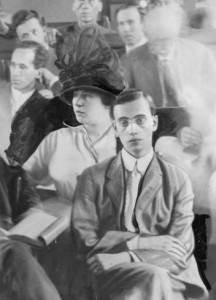From DPLA’s original press release, available here.
In concert with the American Library Association national conference in Orlando, Florida, this week, the Digital Public Library of America (DPLA) and FamilySearch International, the largest genealogy organization in the world, have signed an agreement that will expand access to FamilySearch.org’s growing free digital historical book collection to DPLA’s broad audience of users including genealogists, researchers, family historians, students, and more.
Family history/genealogy continues to be a popular and growing hobby. And FamilySearch is a leader in the use of technology to digitally preserve the world’s historic records and books of genealogical relevance for easy search and access online. With this new partnership, DPLA will incorporate metadata from FamilySearch.org’s online digital book collection that will make more than 200,000 family history books discoverable through DPLA’s search portal later this year. From DPLA, users will be able to access the free, fully viewable digital books on FamilySearch.org.
The digitized historical book collection at FamilySearch.org includes genealogy and family history publications from the archives of some of the most important family history libraries in the world. The collection includes family histories, county and local histories, genealogy magazines and how-to books, gazetteers, and medieval histories and pedigrees. Tens of thousands of new publications are added yearly.
“We’re excited to see information about FamilySearch’s vast holdings more broadly circulated to those trained to collect, catalog, and distribute useful information. Joint initiatives like this with DPLA help us to further expand access to the rich historic records hidden in libraries and archives worldwide to more curious online patrons,” said David Rencher, FamilySearch’s Chief Genealogy Officer.
Dan Cohen, Executive Director of DPLA, sees the addition of FamilySearch’s digital book collection as part of DPLA’s ongoing mission to be an essential site for family history researchers: “At DPLA, we aspire to collect and share cultural heritage materials that represent individuals, families, and communities from all walks of life across the country, past and present. The FamilySearch collection and our continued engagement with genealogists and family researchers is critical to help bring the stories represented in these treasured resources to life in powerful and exciting ways.”
FamilySearch is a global nonprofit organization dedicated to the discovery and preservation of personal and family histories and stories, introducing individuals to their ancestors through the widespread access to records, and collaborating with others who share this vision. Within DPLA, FamilySearch’s book collection will be discoverable alongside over 13 million cultural heritage materials contributed by DPLA’s growing network of over 2,000 libraries, archives, and museums across the country, opening up all new possibilities for discovery for users and researchers worldwide.
Find more about FamilySearch or search its resources online at FamilySearch.org. Learn more about Digital Public Library of America at https://dp.la.
About FamilySearch
FamilySearch is the largest genealogy organization in the world. FamilySearch is a nonprofit, volunteer-driven organization sponsored by The Church of Jesus Christ of Latter-day Saints. Millions of people use FamilySearch records, resources, and services to learn more about their family history. To help in this great pursuit, FamilySearch and its predecessors have been actively gathering, preserving, and sharing genealogical records worldwide for over 100 years. Patrons may access FamilySearch services and resources for free at FamilySearch.org or through more than 4,921 family history centers in 129 countries, including the main Family History Library in Salt Lake City, Utah.
About the Digital Public Library of America
The Digital Public Library of America strives to contain the full breadth of human expression, from the written word, to works of art and culture, to records of America’s heritage, to the efforts and data of science. Since launching in April 2013, it has aggregated more than 13 million items from 2,000 institutions. The DPLA is a registered 501(c)(3) non-profit.
Media Contacts
DPLA: info@dp.la
FamilySearch: news@familysearch.org


